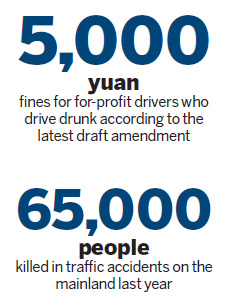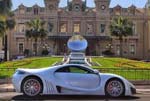Hot Issues
Drunken drivers to be parked for 10 years
Updated: 2011-04-21 07:59
By Zhao Yinan and Cao Yin (China Daily)
BEIJING - Lawmakers hope harsh new penalties will force drunken drivers off the nation's roads and are set to pass legislation that will mean drunks could lose their licenses for up to 10 years and face fines of up to 5,000 yuan ($766).
The draft amendment to the current drunken-driving regulations is now before the nation's top legislature.
Under the proposed new rules, ordinary drunken drivers will not be able to recover their licenses for five years if they are revoked and will be fined 2,000 yuan.
| ||||
The amendment also proposes that for-profit drivers should face even harsher punishments for drunken driving, with a 10-year license revocation and 5,000-yuan fines.

Drunken drivers who cause "major road accidents that constitute a crime" will be banned from driving for life.
The draft amendment to the Law on Road Traffic Safety has been submitted to the National People's Congress (NPC) Standing Committee for review at its bimonthly session on Wednesday.
If adopted, the revised law will ensure punishments are as severe as they are in some Western countries.
In Australia, repeat offenders can be sentenced to up to 10 years in prison and have their name listed on the Drunken Driving and Imprisonment column in local newspapers.
In the United States, punishments for drunken driving differ from place to place. In general, first-time drunken drivers who do not flee or cause casualties lose their license for six months and face fines of between $1,500 and $1,800.
Some states have introduced special measures to prevent drunks getting behind the wheel. In Washington DC, drivers are forced to watch educational films about road accidents. In California, repeat offenders are ordered to visit a mortuary to see people who have died in car accidents.
Members of the NPC Standing Committee, however, were divided over economic penalties. While some supported the change, others argued a nationwide standard might be too much.
Lang Sheng, vice-chairman of the Legislative Affairs Commission of the NPC Standing Committee, said a universal standard is not appropriate because of the imbalanced economic development between the west and the east of the country.
Yang Huanning, vice-minister of public security, told members of the NPC Standing Committee that more severe punishments were needed because drunken driving makes the roads less safe, endangers lives and has a negative social impact.
Official statistics show that China had more than 200 million automobiles and drivers on the mainland by the end of 2010, with about 20 million vehicles added annually.
And fatal car accidents are on the rise, which has become a major cause of death for Chinese people under 45, triggering heated discussions and calls for stricter penalties. More than 65,000 people were killed in traffic accidents last year.
The tougher punishments, however, sparked questions from the public and academics.
Tong Guangqi, 31, a Beijing-based convenience store owner, told China Daily he supports the reform in terms of raising fines but wonders what constitutes a "major accident".
"After all, driving is one of people's basic rights. A lifetime ban on driving needs further consideration," he said.
His concerns were echoed by Yu Lingyun, a law professor at Tsinghua University, who admitted that the current draft amendment fails to give a clear definition of what kind of accidents will be considered "major".
He said it is important to curb the number of people driving while drunk - a growing problem in recent years - but law enforcement requires a clear judicial interpretation.
Zhang Zhuting, a member of a legal consulting committee under the Ministry of Transport, suggested that various additional measures could also be introduced to cut down on the number of drunken drivers.
"Some Western countries install a machine in cars to test the driver's alcohol consumption that can prevent the engine from starting if the concentration exceeds the legal limit," Zhang said.
Specials

Peking Opera revival
Traditional opera is enjoying a revival in Beijing thanks to some modern touches.

25 years after Chernobyl
Belarus, Ukraine and Russia will mark the 25th anniversary of the nuclear reactor explosion in Chernobyl.

Luxury car show
The world's most prestigious luxury, sports cars and supercars are displayed in Monaco.



